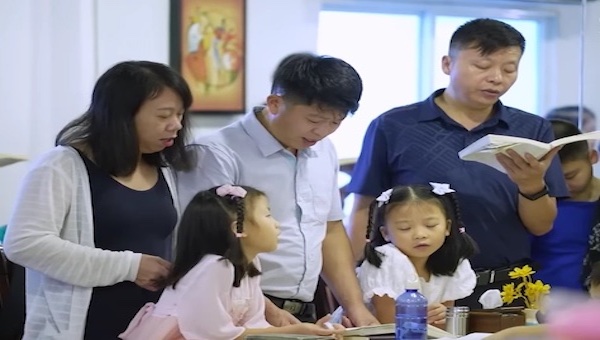
"MAYFLOWER CHURCH" MEMBERS WHO FLED CHINA PARTICIPATE IN A WORSHIP SERVICE.
| YOUTUBE/CBN NEWS
CHINESE MAYFLOWER CHURCH MEMBERS RESETTLED IN US AFTER 3-YEAR QUEST FOR ASYLUM
BY: ANUGRAH KUMARORIGINAL SITE: CHRISTIAN POST
TOPICS
Activism
AI
Belief
Big Pharma
Conspiracy
Cult
Culture
Economy
Education
Entertainment
Environment
Faith
Global
Government
Health
Hi Tech
Leadership
Politics
Prophecy
Science
Security
Social Climate
Universe
War
The 63 members of China's "Mayflower Church" who fled persecution in China arrived in the United States on Friday, intending to resettle permanently after being granted humanitarian parole status amid a harrowing three-quest for asylum.
In November 2019, the Christians, comprising 32 children, from Pastor Pan Yongguang's Shenzhen Holy Reformed house church (dubbed "Mayflower Church") fled to Jeju Island in South Korea after encountering threats and interrogations from Chinese police.
Initially seeking refuge in South Korea, they later traveled to Bangkok, Thailand, hoping to obtain refugee status from the United Nations. However, they were detained by Thai immigration authorities.
Through close coordination with the U.S. Department of State, Department of Homeland Security, various U.N. agencies and the Thai government, U.S. officials successfully negotiated their release, the U.S.-based group ChinaAid, which advocates for civil freedoms and human rights in China, said in a statement to The Christian Post.
Freedom Seekers International, a Texas-based group that rescues, resettles and sustains those who are persecuted for their faith, will aid in the resettlement of the congregation. ChinaAid hosted a welcome event at Dallas Fort Worth International Airport on Friday night.
"This is a successful example of nonpartisan, international cooperation," ChinaAid CEO Chad Bullard said. "We are thankful to all parties including various U.S. government agencies, particularly the State Department's International Religious Freedom Office led by Ambassador Rashad Hussain, the U.S. Embassy in Bangkok, USCIRF, and a number of congressional offices including Chairman Mike McCaul and Chairman Chris Smith."
Rep. Smith, R-N.J., chairman of the Congressional-Executive Commission on China and Chairman of the House Foreign Affairs global human rights subcommittee, has long been at the forefront of voicing concern about China's human rights violations in the federal legislature. He has advocated for the churchgoers in diplomatic limbo as they faced the possibility of refoulement to China.
"It is a very Good Friday indeed, and a perfect Easter gift to see these persecuted Chinese Christians arrive and be allowed to practice their faith freely in the United States," Smith said in a statement. "Had they been forcibly repatriated to China, they would have been jailed and severely persecuted."
Johnnie Moore, an Evangelical public relations executive who served as a commissioner on the U.S. Commission on International Religious Freedom, said the churchgoers' resettlement makes him "so proud to be an American."
"In [the U.S.], we provide refuge to the persecuted," Moore tweeted . "No country in human history has given refuge to so many persecuted people of faith. Welcome to your new home, Mayflower family....just in time for Easter. You're safe here."
On March 30, authorities in Thailand detained the church members, separating families and placing them in two facilities, including the notorious Immigration Detention Center in Bangkok, for overstaying their visas.
The members hiding in Pattaya had to stay the night in the Nong Prue police station, sleeping on tables and chairs pushed together, ChinaAid reported earlier .
In detention, the members faced imminent danger of international kidnapping and repatriation, which could have led to retaliation, abuse and imprisonment by the Chinese Communist Party, Fu said.
Southern Baptist congregations and other churches in East Texas have pledged to sponsor the resettlement of the exiled Christians.
This is the first known instance of a Chinese church fleeing persecution en masse. The church's name, Mayflower, comes from the English ship that carried passengers — some of whom were Protestant separatists seeking religious freedom from the Church of England — who traveled to the British colonies in the 17th century.
Pastor Pan earlier said the decision to leave China was influenced by a lunch he had with Pastor Wang Yi of Chengdu's Early Rain Covenant Church in 2018. Wang, who is now serving a nine-year sentence , urged Pan to prepare himself to go to prison as well.
After Wang's arrest, police started monitoring Pan and making in-person visits on a regular basis to intimidate him and other church members.
Eventually, Pan and his church members had to decide whether to leave China or stay. Despite having good jobs in China, they were concerned about raising their children in a godly manner amid communist pressure and indoctrination, Pan shared.
After a year of discussions, they unanimously agreed to leave China, knowing that each Sunday could be their last together, he said.
The U.S. State Department has long listed China as a country of particular concern for tolerating or engaging in religious freedom violations.
Open Doors USA, which monitors the persecution of Christians in over 60 countries, estimates that China has more than 97 million Christians, many of whom worship in unregistered or "illegal" underground churches.
The five state-sanctioned religious groups in China are the Buddhist Association of China, the Chinese Taoist Association, the Islamic Association of China, the Protestant Three-Self Patriotic Movement and the Chinese Patriotic Catholic Association.
Even the organizations affiliated with the five authorized religions can be subject to surveillance and monitoring.
In 2018, the communist regime released a document titled "China's Policies and Practices on Protecting Freedom of Religious Belief ." It declared that Chinese faith communities "should adhere to the direction of localizing the religion, practice the core values of socialism, develop and expand the fine Chinese tradition and actively explore the religious thought which accords with China's national circumstances."
